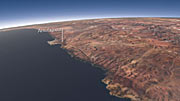Press Release
ESO and Chile sign agreement on E-ELT
13 October 2011
At a ceremony today in Santiago, Chile the Chilean Minister of Foreign Affairs, Alfredo Moreno and ESO’s Director General, Tim de Zeeuw, signed an agreement regarding the European Extremely Large Telescope. This agreement between ESO and the Chilean government includes the donation of land for the telescope, as well as a long-term concession to establish a protected area around it, and support from the Chilean government for the establishment of the E-ELT.
The European Extremely Large Telescope (E-ELT), with its 40-metre-class primary mirror, has been dubbed the world’s biggest eye on the sky. In March 2010, the mountain Cerro Armazones in the region of Antofagasta in Chile was selected by ESO as the future site for the E-ELT. The new telescope will be integrated into the Paranal Observatory, already comprising the Very Large Telescope (VLT), the VLT interferometer and the Survey Telescopes. Cerro Paranal is only 20 kilometres from Cerro Armazones and much of the infrastructure can be shared between the two sites.
This agreement represents another significant contribution to the scientific and technological cooperation between Chile and ESO, which began in 1963 with the signature of the first agreement. ESO and Chile have cooperated in many joint astronomy-related projects in instrumentation and technology, as well as the training of scientists, engineers and technicians, with the goal of further developing astronomical competence and awareness in Chile, which is one of the world’s leading astronomical regions.
“This agreement makes it possible to construct the E-ELT as part of the VLT system. It also greatly increases our involvement and cooperation with Chilean society and will open up further possibilities for great discoveries and technological progress,” said Tim de Zeeuw, Director General of ESO.
The agreement includes the donation of 189 km2 of land around Cerro Armazones for the installation of the E-ELT as well as a concession for 50 years relating to the surrounding area, representing an additional 362 km2 , which will protect the E-ELT from light pollution and mining operations. With the current 719 km2 of land around Cerro Paranal the total protected area around the Paranal–Armazones complex will thus reach 1270 km2 .
The Chilean Minister of Foreign Affairs Alfredo Moreno said: “Chile has the clearest skies on Earth and hosts the most important centres for astronomical observation. It is part of our assets and also part of our contribution to humanity. The presence of ESO and the E-ELT project in our country are an important demonstration of the interest of Chile in promoting technology and science”.
The Chilean government also expressed its commitment to provide infrastructure support, such as maintaining the road system connecting the observatories to Antofagasta, assistance in connecting the Paranal Observatory to the national power grid, as well as assistance in studying possible renewable power supply solutions.
In exchange, ESO extends the agreed 10% share of observing time for proposals from Chilean astronomers to the E-ELT. At least three quarter of these proposals will be allocated to Chilean astronomers cooperating with astronomers from ESO Member States. This will help foster international collaborations — a fundamental ingredient in a mega-science project of this dimension.
The E-ELT is ESO’s most ambitious project so far. With the start of operations planned for early in the next decade, the E-ELT will tackle the biggest scientific challenges of our time, and aim for a number of notable firsts, including tracking down Earth-like planets around other stars in the "habitable zones" where life could exist.
More information
ESO, the European Southern Observatory, is the foremost intergovernmental astronomy organisation in Europe and the world’s most productive astronomical observatory. It is supported by 15 countries: Austria, Belgium, Brazil, Czechia, Denmark, France, Finland, Germany, Italy, the Netherlands, Portugal, Spain, Sweden, Switzerland and the United Kingdom. ESO carries out an ambitious programme focused on the design, construction and operation of powerful ground-based observing facilities enabling astronomers to make important scientific discoveries. ESO also plays a leading role in promoting and organising cooperation in astronomical research. ESO operates three unique world-class observing sites in Chile: La Silla, Paranal and Chajnantor. At Paranal, ESO operates the Very Large Telescope, the world’s most advanced visible-light astronomical observatory and two survey telescopes. VISTA works in the infrared and is the world’s largest survey telescope and the VLT Survey Telescope is the largest telescope designed to exclusively survey the skies in visible light. ESO is the European partner of a revolutionary astronomical telescope ALMA, the largest astronomical project in existence. ESO is currently planning a 40-metre-class European Extremely Large optical/near-infrared Telescope, the E-ELT, which will become “the world’s biggest eye on the sky”.
Links
Contacts
Massimo Tarenghi
ESO Representative in Chile
Santiago, Chile
Tel: +56 2 463 3143
Cell: +56 9 98 95 81 25
Email: mtarengh@eso.org
Lars Lindberg Christensen
Head, ESO education and Public Outreach Department
Garching bei München, Germany
Tel: +49-89-3200-6761
Cell: +49-173-3872-621
Email: lars@eso.org
About the Release
| Release No.: | eso1139 |
| Name: | Cerro Armazones, Extremely Large Telescope |
| Type: | Unspecified : Technology : Observatory |
| Facility: | Extremely Large Telescope |






